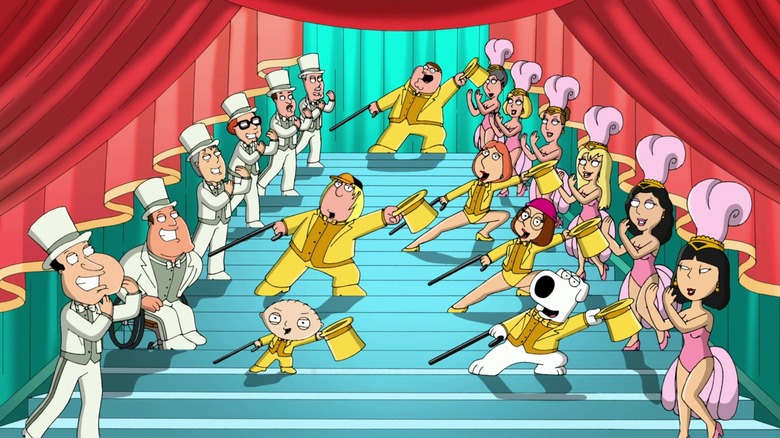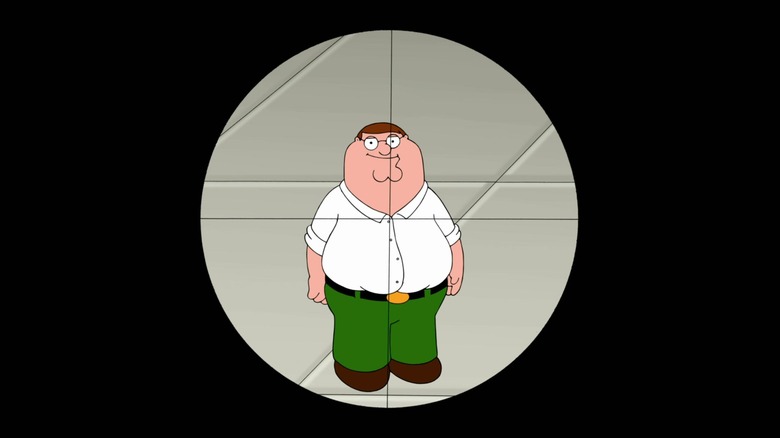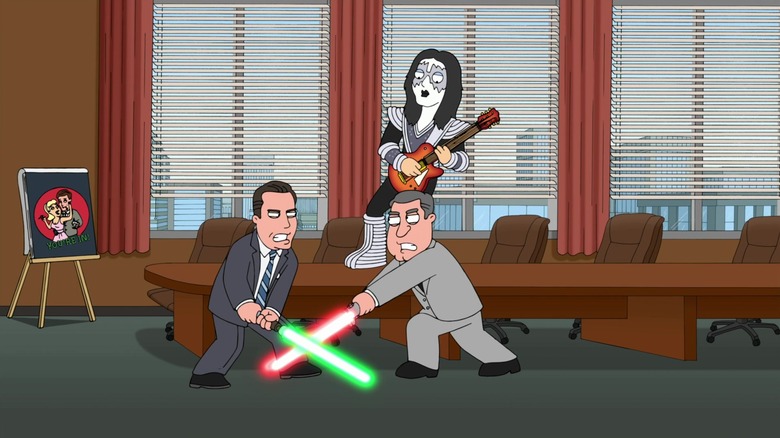Why Family Guy Can Still Be So Controversial Today (And Get Away With It)
Seth MacFarlane's animated sitcom "Family Guy" has long traded in shock humor and crass jokes. Like a fratboy-ready version of "The Simpsons," "Family Guy" came into being when many comedians and TV shows were testing the limits of what was deemed acceptable on television. Many of said comedians were pushing back against the still-remembered manufactured wholesomeness of Reagan's 1980s. MacFarlane was born in 1972, so he grew up witnessing the blandness of the "classic American sitcom." There was also a general cultural bristling at the 1990s trend toward "politically correct language," even from those who agreed with the sentiment toward sensitivity.
MacFarlane's "Family Guy" opened with a riff on the title sequence for "All in the Family," and then exploded into a glitzy song-and-dance routine about (ironically, of course) restoring "good old-fashioned values." The title was ironic, though. Peter Griffin (MacFarlane) was not a "family guy" at all, but a crass, media-blinded, alcoholic jerk with tendencies toward sexism and bigotry. The old-fashioned values, MacFarlane was declaring, were actually horrific and dated.
Much of the shock humor on "Family Guy" is intended to be a send-up of sexist, bigoted attitudes so often seen in "good old-fashioned" TV shows, revealing how rotten a lot of America's core Conservative values really are. With many of the show's jokes, though, the line in blurred. Sometimes, MacFarlane is making a comment. Sometimes, he's just being crass for the sake of it. There will be at least one joke per episode that will offend most people.
"Family Guy" has ridden that line for 426 episodes over the course of 23 seasons. The show has been canceled and resurrected, and it shows no signs of ending anytime soon. In a 2022 interview with The Hollywood Reporter, MacFarlane, and producers Alec Sulkin and Rich Appel, theorize how they've been able to get away with it for so long. MacFarlane posits that few people are genuinely offended by his show.
Seth MacFarlane feels that no one is actually, genuinely offended by Family Guy
MacFarlane found no evidence (at least anecdotally) that anyone was genuinely offended by any of his edgy jokes on "Family Guy." He said that he had encountered a few thoughtful essays and thinkpieces about how someone might be offended by "Family Guy," or how the series is some sort of cultural bellwether for diminished respect toward our fellow humans, but he never spoke with someone who was openly miffed (except for the occasional celebrity he mocked).
He noted that there was some outrage from the users of Twitter (transformed into the social media nightmare that is now X), but MacFarlane was wise enough to acknowledge that Twitter users weren't any kind of serious cross-section of his viewing audience. Social media, he knew, isn't reality. MacFarlane said:
"The supposed outrage, I don't find a lot of it in the real world. I read a lot about it on Twitter, which is, as much as we lend credence to it, statistically very fringe. Most people aren't on Twitter. But in terms of comedy, I don't think I've ever talked to a single person in the real world — outside social media and outside think pieces — who is really upset about the state of edgy comedy. If anything, I hear about the opposite. People want to laugh."
It's also worth noting that "Family Guy," being animated, has a lot more leeway to say and do crass things. When a live-action actor says something pointedly antisemitic on a comedy show, it's hard to take because a real person is on tape saying it. With "Family Guy," the dark jokes are repeated by big-eyed caricatures, talking dogs, and other fantastical characters. The absurd visuals take a lot of the edge off.
Family Guy gets away with a lot because the characters are animated
Producer Alec Sulkin notes that "Family Guy" also has to give a lot of credit to fellow producer Rich Appel, who has a keen eye for what can and cannot be done legally. It's fair play to satirize a public figure, but "Family Guy" sometimes pushed close to the line of legal libel. Appel himself then chimed in, noting that animated shows are able to push the envelope with shock humor by dint of their medium. After all, "The Simpsons" and "South Park," the big brothers of "Family Guy," also get away with "offensive" material, so "Family Guy" was just following suit. Appel said:
"I think if you look at 'South Park' and 'The Simpsons' and our show, it's not a coincidence that they're all animated. And I think people's quote-unquote 'outrage' and willingness to take offense at anything is in a different world when they're animated characters. To me, it's proof that people don't take such offense."
MacFarlane pointed out that one can't angrily Tweet at characters like Peter, Lois, and Stewie Griffin, because they're animated characters. One can't even pretend they live in the real world, and audiences have to accept them in the abstract.
It's easy to "get away with" being offensive when all the evidence points to people not being offended. There will always be a market for edgy, offensive humor, and "Family Guy" has been willing to provide for over two decades. One can certainly level legitimate criticisms at "Family Guy" — the makers of "South Park" have openly satirized the show's favoring of pop culture references over story — but the show's inappropriate humor is, I think we can all agree, not one of its grand weaknesses.


